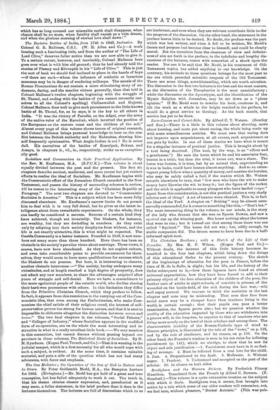Socialism and Communism in their Practical Application. By the Rev.
M. Kaufmann, M.A. (S.P.C.K.)—This volume is about equally divided between the past and the present. The first six chapters describe ancient, mediasval, and more recent but yet extinct efforts to realise the ideal of Socialism. Mr. Kaufmann begins with the Communistic effort of the Jerusalem Church recorded in the New Testament, and passes the history of succeeding schemes in review, till he comes to the interesting story of the "Christian Republic at Paraguay." The next two chapters are devoted to "Communistic Societies in America." This is a subject which has been more fully discussed elsewhere. Mr. Kaufmann's narrow limits do not permit him to deal with it in very full detail, but he gives us the latest in- telligence about these remarkable experiments. On the whole, they can hardly be considered a success. Success of a certain kind they have achieved, though not invariably. The Shakers, for instance, are wealthy, but they are dwindling in numbers. As they exist only by adopting into their society heophytes from without, and the life is not exactly attractive, this is what might be expected. The Oneida Community is a better instance. Founded in 1848, it now num- bers not many more than three hundred. Here there has been an obstacle in the society's peculiar views about marriage. These views, it seems, have now been abandoned. As they do not neglect culture, and even take considerable pains to provide amusement for them- selves, they would seem to have some qualifications for success which the Shakers do not possess. But here, it is interesting to observe, another obstacle intervenes :—" The society, having undergone many vicissitudes, and at length reached a high degree of prosperity, does not admit any new members, to share the advantages acquired after years of struggle and self-denial. Here we have a resemblance to the more egotistical people of the outside world, who decline sharing their hard-won possessions with others. In this limitation they differ from the Primitive Christian Church, which they profess to follow. In fact, it appears from this restriction in the carrying-oat of the Com- munistic idea, that even among the Perfectionists, who make Com- munism the chief article of their religious creed, the interest of self- preservation proves too strong for human nature, and that it is next to impossible to obliterate altogether the distinction between meum and tuum." The two final chapters in the volumes, "Social Palaces," and "Colleges of Industry," where Socialism appears in the modified form of co-operation, are on the whole the most interesting and in- structive in what is a really excellent little book.—We may mention in this connection, but cannot discuss without passing beyond our province in these columns, The Historical Basis of Socialism. By H. M. Hyndman. (Began Paul, Trench, and Co.) —That it is wanting in the judicial temper, which is a first necessity for all who would cope with such a subject, is evident. At the same time, it contains valuable material, and puts a side of the question which has not had many advocates, with force and emphasis.


































 Previous page
Previous page